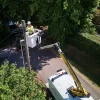Openreach Give ISPs 48 Hours to Remove Lithium Batteries from UK Exchanges UPDATE

Network operator Openreach took a few communications providers by surprise yesterday after they gave them just 48 hours to remove any lithium batteries from BT exchanges. The batteries are said to be prohibited by the operator’s building safety policy “due to the significant risks … [of] thermal runaway, fire and explosion“.
The move is interesting, as we’ve not previously been aware of any specific restriction being imposed against the use of a particular type of battery chemistry in Openreach’s rules, which usually adopt generalised language when discussing batteries. Some comms providers also told ISPreview that they were similarly uncertain about exactly where in Openreach’s docs this is expressed.
The official briefing, which isn’t available to the public, seems to refer specifically to the use of lithium batteries that exist within Colocation or Access Locate customer cabinets within BT’s exchanges. “Openreach mandates the use of lead acid batteries as the preferred and safest option for battery back up in CPs’ colocation or Access Locate customer cabinets,” said the briefing (a slight contradiction – using both “mandates” and then “preferred“).
Advertisement
The briefing also fails to make any distinction between regular LiPo (lithium polymer) and LiFePO4 (lithium iron phosphate) batteries. The latter, which are now used in many industrial and home storage energy applications, have a safety record that is similar or even better than sealed lead acid batteries; because their unique chemical composition is less prone to overheating and thermal runaway.
Not to mention that lead-acid batteries contain hazardous substances like lead (obviously) and sulphuric acid, while LiFePO4 batteries are constructed with more non-toxic materials that can be recycled. Suffice to say that the blanket restriction against “lithium” seems unusual, and it may have been more forward-thinking to express stricter requirements.
In any case, Openreach clearly has serious safety concerns after identifying that “lithium batteries” are in use in some of BT’s exchanges, and they’ve now given such providers just 48 hours to remove them (on the surface this seems like an unreasonably short notice). “This instruction is made and is issued in accordance with the existing Revised Agreement for Access Network Facilities Services (“RANF Agreement”) and Access Locate contract. The relevant Product Description(s) will be updated accordingly to capture this instruction,” said Openreach. Providers must also notify the operator about their use of such batteries..
We’ve requested a bit more information from Openreach and will report back later.
Advertisement
UPDATE 1:57pm
Openreach informs ISPreview that they’ve only found an extremely small number of cases and thus don’t believe the move will have a significant impact.
A spokesperson for Openreach told ISPreview:
“Safety is our number one priority, so we pay close attention to best practice, expert research and industry recommended standards when it comes to fire safety.
During a recent annual maintenance check in one of our exchanges, we discovered a handful of lithium batteries linked to some equipment owned by one Communications Provider.
This is extremely unusual. The use of batteries is rare in itself and, any CPs that do, overwhelmingly use the safer lead/acid variety.
We don’t believe this is a widespread issue which will impact any other CPs but, given the importance of safety in our buildings and wider estate, we felt it was the right thing to do to send out guidance on battery usage.”
Mark is a professional technology writer, IT consultant and computer engineer from Dorset (England), he also founded ISPreview in 1999 and enjoys analysing the latest telecoms and broadband developments. Find me on X (Twitter), Mastodon, Facebook, BlueSky, Threads.net and Linkedin.
« Sky Mobile Customers Suffer Spate of UK eSIM Activation Problems






















































Look on the bright side, they’re still happy to have them in engineers vans parked outside their houses though.
Rather than having a large tank of combustible liquid under their seat?
Tanks of diesel don’t tend to spontaneously combust for no apparent reason, in fact most ICE vehicle fires start in the electrical system.
What will Openreach do if the batteries aren’t removed by the weekend? Start removing operator equipment?
They might try fining them, but that will open a can of worms regarding if operators were properly notified of the requirement originally. An argument that it sounds like Openreach will lose.
Rate of fires in EVs is around 25 per 100k vehicles annually , for diesel it is 350-400 per 100k, petrol 1100-1300.
A 48-hour deadline and the failure to distinguish between regular LiPo and LiFePO4 suggests that this decision was made by someone who is non-technical illiterate.
A non-technically literate person in a (presumably senior) management role in BT/Openreach? I don’t believe it!
The other possibility is that their insurance provider has introduced new restrictions, and it’s not trickled down as quickly as it should.
I wonder if lithium coin cells used for CMOS batteries are also banned
What about Li-ion, as used in APC ups?
Aren’t APC still NiMH/Lead Acid for their commercial UPS units?
I know mine all were.
You just really don’t see Li Ion in industrial leading UPS because it is considered a dangerous chemistry of a battery when used into series and parallel to meet the power requirements. Cell level fusing has always been considered expensive, only now are we seeing innovation like nickle strips that are designed to provide that extra safety feature but it’s so late to the game, many just are opting for the safer chemistry, because even with cell level fusing, it’s still not as safe as the new chemistry of lp4.
If your not awhile, or make others aware each cell has to be individually fused, a lot of the 18650 and 21700 lithiums being used in less commonly known UPS brands and DIY UPS are high risk. When a cell shorts inside all the other batteries on the circuit then surge massive amounts of current towards the shorted cell, causing thermal runaway. The risk increases for every cell you have, no only are you increasing the chances of a battery ever shorting, you have all those good cells adding up to cause the massive surge.
Laptops have used these batteries for decades and I have seen the damage they can cause, but thankfully battery technically improved from using bulky 9 cells to often 3 or 4, greatly reducing the risks.
Sadly China is pumping out loads of while battery packs for power banks, and ebikes without cell level fusing using this technology and as those batteries increase age, so does the risk of thermal runaway.
Always buy branded battery packs as they have most likely gone through safety testing, take a DeWalt battery, capable of many hundreds of watts have the RD of billions, a DeWalt 3rd party does not.
Having seen and smelled the mess created by an exploding Pb-S exchange battery, I would prefer the chemical splodge created by a failed LiFePO any day.
But the growing risk from ever more numerous lithium ion batteries, within access racks close to the heart of the exchange, is not new. And BT has known about it for well over a decade or two.
Forty eight hours is … cheeky.
I suspect it is a decision imposed by their insurers, which has just been passed on without anyone actually looking at the technical (or possibly even the commercial, given that Mark can’t find a contractual requirement) consequences.
Surely the Openreach exchange itself should have UPS equipment and associated batteries supporting the power feed to the data halls housed in a plant room properly designed to contain and suppress a battery fire. Their customers shouldn’t need to install their own UPS systems in the cabinets.
Exchanges don’t have battery rooms. UPS are required to sustain power until the generator kicks in
Why would any CP require battery backup of their own, lithium or otherwise? The standard is (or certainly was) for CP racks to be connected to the protected exchange supply. That has battery backup with generator failover if the outage persists for more than a handful of seconds.
Allowing everyone with a rack in an exchange to engineer their own backup solution would be madness.
Not all exchanges have enough capacity to provide backup power, and even then it can be generator only and you want to protect against a switch in supply causing a glitch
Adding to above maybe they’ve AC equipment and only DC is protected.
Come on,how is any business going to source new batteries in 48 hours? BT Cannot do anything in 48 hours, so why expect it from others.
OR exchange colocation product is called Access Locate and it has several resilient power options provided by OR as a managed service to provide AC and DC power.
There is no reason for a CP to house their own UPS/battery in the exchange and it is very unusual.
Must be imagining needing to replace AC for DC PSUs as no reliable AC backup available in two exchanges. My bad.
Firstly, while they do provide resilient power in exchanges it is not guaranteed that the exchange will have sufficient ESS capacity to provide it to every CP and there is also a gap between mains power being lost in an exchange and the ESS genset spinning up so having a UPS to fill the gap there is essential.
Secondly, a significant amount of telecoms equipment is DC-powered which requires CPs to have rectifiers and battery banks in their rack to power.
Saying there is no reason for a CP to house their own UPS/battery is just wrong, as is saying it’s unusual for CPs to do this.
What about CR2032 button cells, used as memory backup batteries absolutely everywhere? They’re also ‘lithium batteries’.
Do you get invited to a lot of parties Toby?